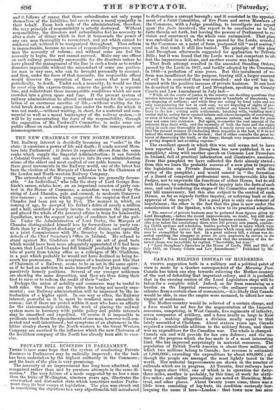PRIVATE BILL BUSINESS IN PARLIAMENT.
THERE is now some hope that the system of conducting Private Business in Parliament may be radically improved; for the task has been undertaken by the highest authority in the Commons ; and the basis of the plan is very promising. The necessity of an improvement has long been admitted, and recognized rather than met by previous attempts in the same di- rection.* The very failure of a mode suggested by no less a man than the Duke of Wellington nineteen years ago, illustrates the overworked and disti acted ;tate which sometimes makes Parlia- ment drop its best essays at legislation. The plan was struck out in considering the objections to 'a very objectionable bill introduced
to disfranchise a corrupt borough ; iand it consisted in the appoint- ment of a Joint Committee, of five Peers and seven Members of the Commons, with a Judge presiding, to investigate and report upon the facts 'involved ; the report to be conclusive as to the facts therein set forth, but leaving the powera of Parliament in re- vision and enactment on the whole case unimpaired. That plan was'embodied in a bill, which was passed by the Lords, arrested in the Commons on a point of form, postponed till" next sessiors,", and in that tomb it still lies buried. The principle of this plan Lord Brougham afterwards suggested for application 'to -Priielitel Bills ; but it was found that the Lords were not competent teret: feet the improvement alone, and another course was taken. ' ; • -1 . That fresh attempt resulted in the amended Standing Grdersy passed by the Lords in 1837, and tardily adopted by the Comiteres! in 1846—a probation of nine years. But this instalment Of .re- form was insufficient for the purpose, leaving still a larger amount of evil to be corrected than was remedied : and the evil has in- creased with the positive increase of private business. It can best be described in the words of Lord Brougham, speaking on County Courts and Law Amendment in July last- " While all the courts of justice in the country are deciding questions that involve interests to the amount of thousands or hundreds of thousands.; we are disposing of millions ; and while they are acting by fixed rules and are only administering the law in each case, we are disposing of rights of pro- perty to this enormous amount, not only without any known law, but con- trary to the law ; setting aside settlements, breaking wills, violating inen's vested rights, acting for or against infants and others incapable of consenting, or even of knowing what is done, nay, persons unborn, and who for years may not come into existence. But again, to consider the vast amount of the interests thus dealt with, and the necessity of both the facts and the rights being in each case thoroughly investigated, it surely never can be contended that the present manner of conducting these inquiries is the best, if it be not indeed the worst possible to be devised ; that it either consults the great in.: terest of discovering the truth, or the 'ewer, though very important interest, of giving despatch and avoiding expense."
The excellent speech in which this was said seems not to have been reported ; but Lord Brougham has now published it as a pamphlet,t along with another speech on Common Law Procedure in Ireland, full of practical information and illustrative anecdote. From this pamphlet we have collected the facts alreadystated ; from this we learn the probable success of a new plan to improlge the legislation on Private Business. It originated withlzthe writer of the pamphlet ; and would consist in "the formation- of a Board of competent professional men, immoveable like the Judges, not to supersede the functions of either House, but to aid both Houses, by conducting the whole inquiry into the facts of each case, and only rendering the stages of the Committee and report on any bill unnecessary, but this also subject to the control of eaeh House, so far as regards further inquiry, or referring back or dis- approval of the report." But a good plan is only one,element of hopefulness ; the other is the fact that the plan is now under the consideration of the Speaker, with a,view to its practical adoption.
* The amount of private business may be gathered from figures given by Lord Brougham,—before the recent improvements, no doubt, but still indi- cating the kind of dimensions to which this business extends. "In one year (the year before the resolutions) there were 241 private acts passed, contain- ing 13,624 sections and schedules, besides perhaps half as many which were thrown out." The nature of the enormities which creep into private bills may be exemplified by one fact. In a great railway bill, a clause was in- serted enabling the company to prove Its own payments by entries in Its own hoeks 1 When Lord Lyndhurst was told that the existe-nce of the de- tected clause was incredible, he replied, "Incredible, but true!"
I
"Lord Brougham's Speeches in the House of Lords, 26th and 28th of Ju dy 1853, on County Courts and Law Ainendment." Published by Mr.
. . Ridgway.


























 Previous page
Previous page